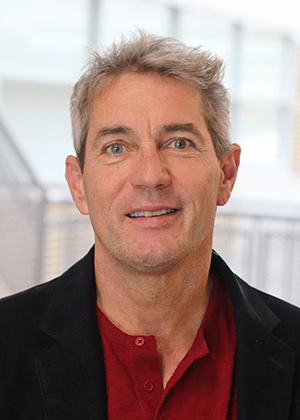UT’s Tomsovic Elected to the National Academy of Engineering

University of Tennessee, Knoxville (UT), Chancellor’s Professor Kevin Tomsovic has been elected to the National Academy of Engineering (NAE), earning one of the highest international honors available to engineering professionals and researchers alike.
“I am honored to have been chosen for inclusion in the National Academy of Engineering,” said Tomsovic, a faculty member in the Tickle College of Engineering’s Min H. Kao Department of Electrical Engineering and Computer Science (EECS) at UT. “The fact that it comes through a selection by your peers is particularly rewarding and helps motivate the drive to continue the important work that we do here.”
Tomsovic is the third active faculty member from UT so honored by NAE, joining UT-Oak Ridge National Laboratory (ORNL) Governor’s Chair Professor for Power Grids Yilu Liu and UT-ORNL Governor’s Chair for Nuclear Materials Steve Zinkle.
“We’re elated for Dr. Tomsovic to have earned this tremendous honor, which reflects his career of scholarly achievement that puts him at the absolute top of the engineering profession,” said Wayne T. Davis Dean’s Chair and Dean of Engineering Matthew Mench. “It is a reflection of his groundbreaking work in intelligent system design and a continuous stream of innovation that has led his field forward for decades.”
Tomsovic’s research focuses on power system computational methods and power engineering education. Specifically, that work includes developing technology for the operation and planning of the modern power grid that can achieve low cost, reliable power with reduced environmental impact.
Tomsovic also directs the Center for Ultra-wide-area Resilient Electric Energy Transmission Networks (CURENT) at UT, a graduated National Science Foundation and Department of Energy Engineering Research Center. Much of his efforts have come through his work with CURENT, where he and Liu serve as director and deputy director, respectively. Noting that, he was quick to praise others in the department for his latest honor.
“I’ve said this before, but it bears repeating: I feel our group of power and energy researchers in EECS is one of the best at any university,” Tomsovic said. “Kevin Bai, Chien-fei Chen, Daniel Costinett, Han (Helen) Cui, Fangxing (Fran) Li, Yilu Liu, Hector Pulgar, Kai Sun, Leon Tolbert, and Fred Wang are an incredible group of faculty to work with, and they all had roles in the work, along with others at UT, that has led to this accomplishment.”
Before the launch of CURENT in 2011, Tomsovic served as department head of EECS at UT, which he came to following his time on faculty with Washington State University from 1992 until 2008.
He earned his bachelor’s degree from Michigan Technological University in 1982 before earning his master’s and doctorate from the University of Washington in 1984 and 1987, respectively, with all three degrees in electrical engineering.
Tomsovic also served as the Kyushu Electric Endowed Chair for Advanced Technology for Electrical Energy with Kumamoto University in Japan and was the National Science Foundation program director with the Electrical and Communications Systems Division of the Engineering Directorate. He has held faculty positions at National Cheng Kung University in Taiwan and the Royal Institute of Technology in Sweden.
Tomsovic was elected as a fellow of the Institute of Electrical and Electronics Engineers (IEEE) in 2007 and was a member of two R&D100 Award-winning teams in 2014 and 2020.
NAE membership reflects extraordinary contributions and efforts made to “engineering research, practice, or education… (and) the pioneering of new and developing fields of technology, making major advancements in traditional fields of engineering, or developing/implementing innovative approaches to engineering education.”
The nomination and selection journey is a year-long process, with ballots distributed in December and voting completed in January. The class will be formally inducted at NAE’s annual meeting on October 1, 2023. Discover the 2023 class of newly elected NAE members.
About NAE
Founded in 1964, the U.S. National Academy of Engineering is a private, independent, nonprofit institution that provides engineering leadership in service to the nation. Its mission is to advance the welfare and prosperity of the nation by providing independent advice on matters involving engineering and technology, and by promoting a vibrant engineering profession and public appreciation of engineering.
